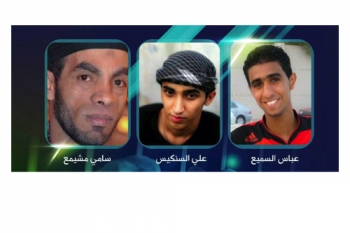(AhlulBayt News Agency) - On 4 December 2016, the sixth higher court of appeal in Bahrain, headed by judge Ebrahim Al-Zayed, upheld death sentences against three individuals, Sami Mushaima, Abbas Al-Samea, and Ali Abdulshaheed Al-Singace; as well as life sentences against five other defendants: Ali Jameel Al-Samea, Taher Al-Samea, Husain Ahmed, Ahmed Matooq and Redha Mushaima. The court also ordered the denaturalization of all of the defendants. We, the undersigned members of the Bahrain human rights community, strongly condemn the confirmation of these sentences and calls on the Government of Bahrain to drop all death sentences immediately.
The detainees were arrested more than two years ago, on 3 March 2014, by security forces in house raids, on charges of allegedly using improvised explosive devices which led to the killing of three police officers, one of them being an Emirati citizen. The state-sponsored media quickly published photos of the defendants, publicly accusing them of murder, before officials completed their investigation. On 26 February 2015, the High Criminal Court convicted them of all charges and passed sentence. On 31 May 2016, a court of appeal rejected their first appeal. Subsequently a court of cassation referred their case back to appeal court in October 2016; however their second appeal was rejected as well. None of these courts have investigated allegations of torture, despite repeated requests from defense lawyers.
The Bahrain Center for Human Rights (BCHR) has closely monitored these cases and has repeatedly raised concerns regarding questionable interrogation practices and ill-treatment of these detainees. The three detainees were refused access to their families and lawyers for several days after their arrest. They reported that security forces subjected them to torture during their interrogation to coerce confessions. Yet, despite concrete evidence against their charges, the Bahraini court convicted Mushaima, al-Samea and al-Singace based off their coerced confessions, and sentenced them to the harshest of all punishments--death. All defendants have denied the charges against them, and plead innocence.
As reported to BCHR, the security forces subjected detainees to more than a week of enforced disappearance, during which they allege that they were tortured by security forces. Several days after his arrest, the mother of Sami Mushaima, one of three individuals sentenced to death, observed that Sami’s teeth were either broken or pulled out. She reported that he was wearing a jacket to conceal signs of abuse, and that there were visible burn marks on his hands. Abbas al-Samea – similarly sentenced to death – also alleged he was subjected to various form of torture, including electric shocks, sleep deprivation, and sexual assault. Other detainees in the case have reported being subjected to the same forms of torture.
Following this latest ruling, the number of Bahrainis on death row now totals eight, two of whom (Mohamed Ramadhan and Hussain Ali Moosa Hussain Mohamed) have have exhausted all legal means of appeal. They await only the king’s confirmation of their execution. Ramadhan was arrested and detained for his participation in the pro-democracy protests after the al-Dair bombing. In detention Ramadhan was subjected to various forms of torture including beating, electrocution, sexual assault and psychological torture, according to his wife Zainab Ebrahim. Moosa was also arrested one week after the al-Dair bombing. Moosa was also a subject of torture while in detention - including beating, threats concerning his family facing fabricated charges and threats to rape his sisters. Both, Ramadhan and Moosa, were forced to sign unknown confessions. They both are sentenced to death for their supposed involvement in a bomb explosion that resulted in the death of a policemen. They continue to await their imminent execution.
The lack of due process is a common practice in Bahrain. The arbitrary prosecution, the failed investigations, and use of torture to coerce confessions are clear signs of legal and due process rights in Bahrain.
The use of the death penalty is a violation of article 6 of the International Covenant on Civil and Political Rights (ICCPR), which Bahrain ratified in 2006, that states that, “Every human being has the inherent right to life. This right shall be protected by law. No one shall be arbitrarily deprived of his life.” Though Article 6 of the ICCPR permits the use of the death penalty in limited circumstances, it also provides that “nothing in this article shall be invoked to delay or to prevent the abolition of capital punishment by any State Party to the present Covenant.” The Government of Bahrain should respect its international commitments and abolish the use of the death penalty.
We, the undersigned, call upon the Government of Bahrain to:
- Commute all death sentences;
- Establish a moratorium on the death penalty with a view to abolition;
- Investigate and prosecute all acts of torture, mistreatment, enforced disappearance; and,
- Establish procedures to ensure the fairness of all criminal trials and appeals.
The names of the detainees sentenced to the death penalty on political cases:
- Sami Mushaima
- Abbas Al-Samea
- Ali Abdulshaheed Al-Singace
- Mohamed Ramadhan
- Hussain Ali Moosa Hussain Mohamed
- Salman Isa
- Hussain Abdulla Khalil Ebrahim
- Maher Al-Kabaz
Signed,
Americans for Democracy & Human Rights in Bahrain
Bahrain Center for Human Rights
Bahrain Institute for Rights and Democracy

